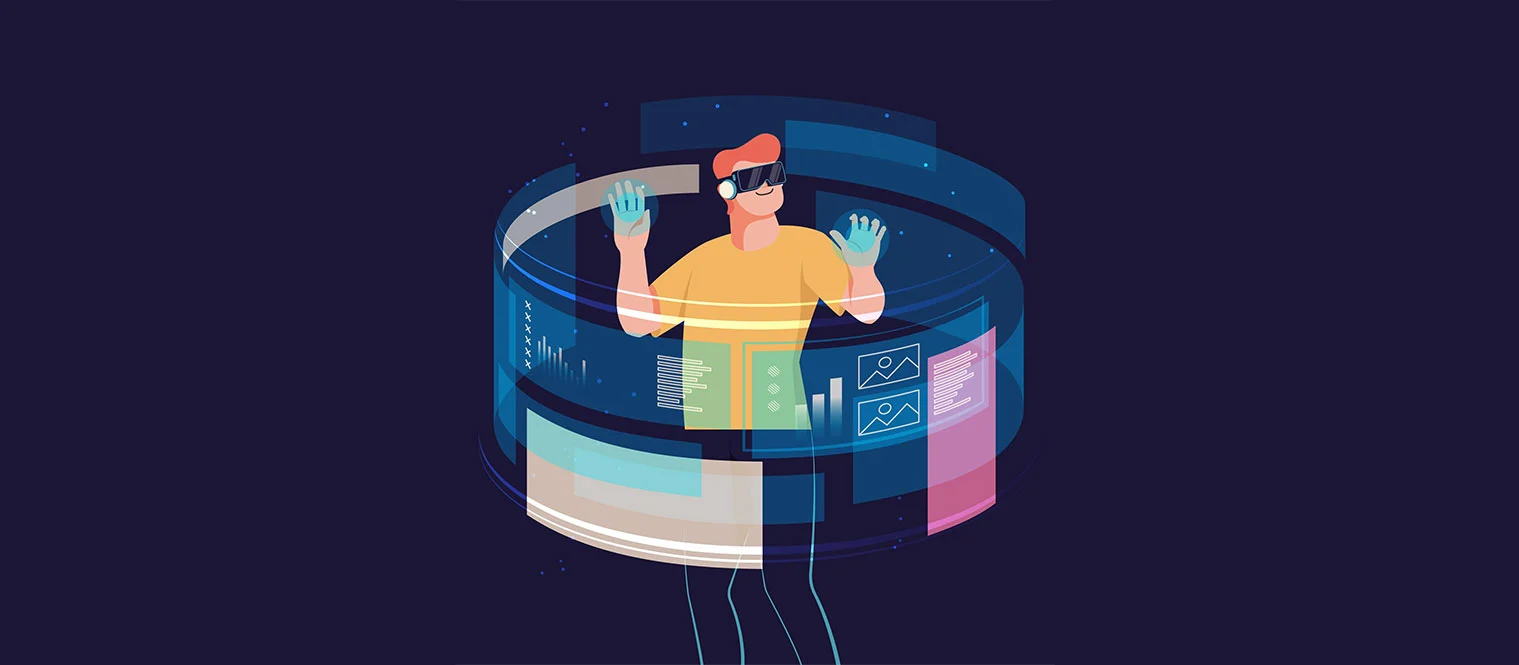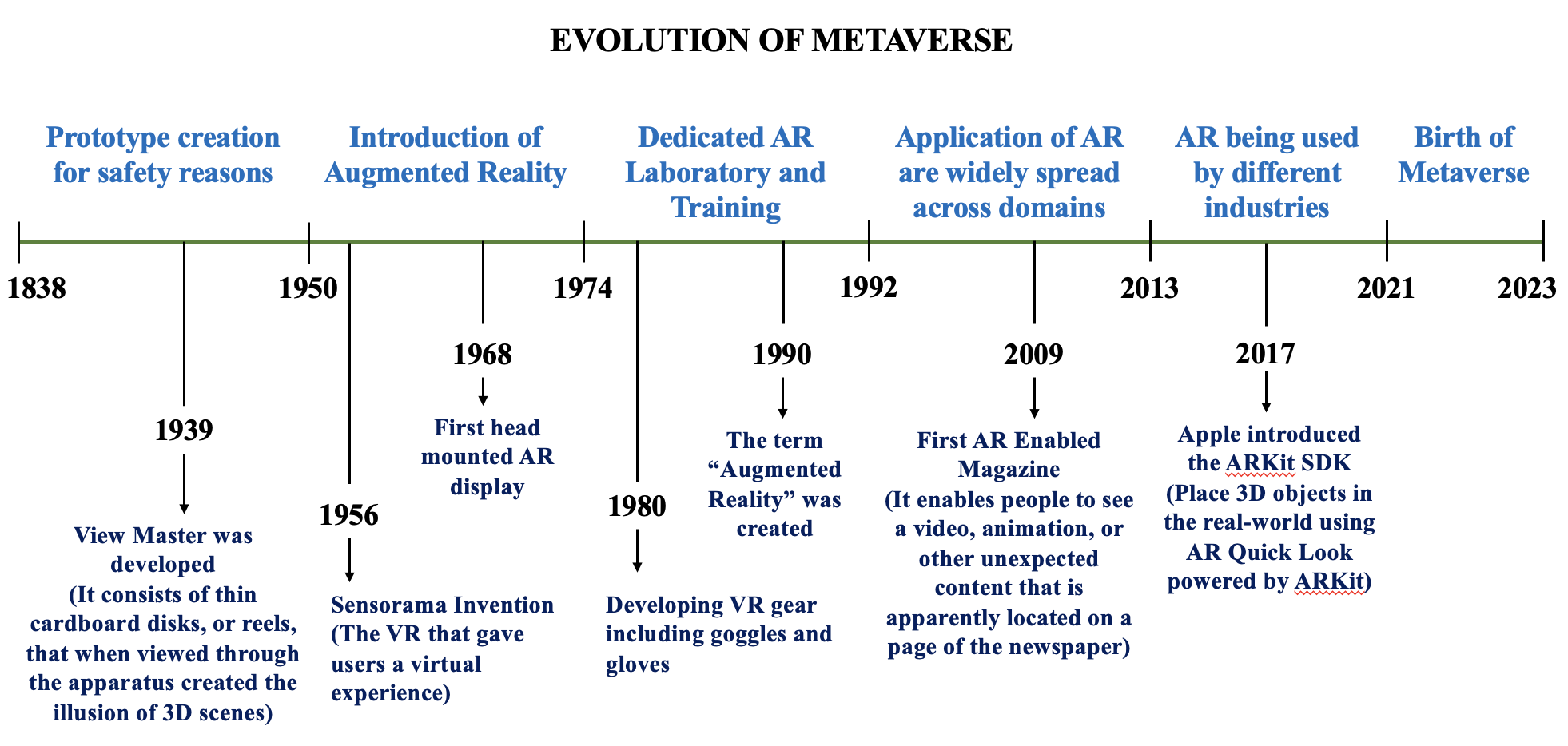
A Naga Sai Purushotham, Dr. P. Swami Sairam
C0004
August 2023
Metaverse is a community-owned online digital platform that enables augmented reality and virtual reality interaction between users. It does not belong to a single dealer and is not dependent on any specific hardware. The decentralized metaverse, that is supported by technologies like artificial intelligence (AI), computer vision, virtual reality, blockchain, etc., is made possible by digital currencies and NFTs. Users can create digital avatars that are representative of themselves to explore their environment by combining various technologies.
The concept of the metaverse has grown in popularity recently as 5G networks have developed a more fast and augmented reality (AR) and virtual reality (VR) technologies have been used more frequently. Because of the outbreak of COVID-19, which has made maximum number of individuals work from their homes, individuals are now greatly conscious of the fact that it may disrupt their day-to-day life. With all this at the place, adding to Facebook's latest entry in the market was observed by the investors and daily basis internet consumers throughout the world.
The Metaverse AR platform allows users to build interactive experiences that blend both the virtual and the real worlds. It additionally may be viewed as an online simulation of the notion or idea. Because of the tools used to access it, this virtual, three-dimensional realm is immersive, collaborative and interactive.
Everything is predicated on the idea that ordinary interactions will be largely transformed into mixed reality, ultimately augmented reality, and virtual reality. The main goal is to create completely interoperable, decentralized, and immersive digital communities.
Everyone in the software, computer, and IT industries is interested in metaverse. It is considered to as the "next version of the internet" by many experts and is made possible by augmented and virtual reality technology. It is just a question of time before this concept is implemented, given the number of its potential use cases.
Everything has gone digital, from payments to identity verification and beyond. Due to this, a virtual setting like the metaverse has the potential to change how businesses and individuals view and utilise technology.
Users wouldn't only be passive information consumers in the metaverse since it would be an "embodied internet". Instead, individuals would engage with pertinent information and live, three-dimensional objects.
Interfaces of the metaverse will have a democratised architecture, which indicates that they won't be run by a single entity, organization, or business. Anyone using cryptocurrencies on the platform will be able to participate in daily decisions. The decentralised nature of the Metaverse will radically change how the completely digital world operates. For instance, it could no longer be viable to perform a big algorithm change without user consent.
These days, we use a two-dimensional interface to connect with internet information. A 2D screen is used, texts and graphics are displayed, and a compliant user interacts with the system sparingly through long-established input methods. The metaverse is the first significant shift in input-output relationships since the invention of the mouse. Through the use of tracking their eyes, spoken instructions, consumers will be empowered to interact with visualised data as if it were a representation of the actual world.
The Metaverse might eventually turn into an environment in which we are all able to "hang out," much like social media is today. It will have an impact on interpersonal dynamics like relationships and friendships and could even enable people from different parts of the globe to come together without the need for travel. As a result, companies and marketers may utilize the Metaverse to reach a wide audience with their advertising.

This attitude, which has recently changed significantly in the workplace, has only become more pronounced because of the pandemic. Nowadays, a lot of companies allow or even encourage their employees to work remotely. And while there are numerous advantages to this, there are also some disadvantages. One of the hardest challenges is keeping in touch with your respective team and being productive when working remotely. The metaverse can help with both of these. It can be used for a variety of purposes, including online teamwork and other team-building exercises.
Indeed, the pandemic caused loss and setback for the travel sector, but virtual travel's potential could result in the birth of a new tourist industry. Before scheduling an in-person contact, visitors can start their trip planning by conducting trip research via virtual and 5G, augmented reality metaverse platforms. With the aid of virtual reality tours, VR headsets, and 360-degree videos, the tourism and travel sector have gained ground in the digital world. Consumers will still continue to augment their real-world trips with the virtual ones, and a setting like this will only make these experiences better. The metaverse, which also provides digital versions of real-world places including digital representations of real estate, allows one to explore simulations of famous buildings and landmarks in their original condition. Traveling in it is also made to be as entertaining as it would be in the real world by using digital avatars. In a virtual environment, users can talk, travel as a team, and share experiences, which can help them form powerful ties.
The future of online entertainment is the metaverse. The entertainment might range from concerts, sporting events and television shows to social networking websites and online gaming. Because these events are frequently more engaging and interactive than their real-world equivalents, fans typically have a more intense connection there. Future has become a reality thanks to the metaverse. By using their virtual selves, their avatars to enjoy and attain the activities they want on the internet rather than in the real world, it lowers physical boundaries so that countless individuals can experience engaging themselves in live performances without leaving their homes.
The metaverse is indeed a place with lots of material that can be a centre for education. A limited learning environment that expands learning hubs is the metaverse. The metaverse has the possibility to become one of the tools used to extend the usage of open and distance learning, a previously established approach that is more commonly recognised. Educational institutions may additionally employ the metaverse reality to produce more engaging media experiences.
Students and teachers may communicate virtually no matter where they are in the real world by wearing virtual reality headsets. The visual potential of a metaverse school then manifests. The instructor can share findings with the students and show the pupils in an alluring 3D environment. Educators are able to create virtual landscapes based on their instructional plans. By enabling learners to visit historical locations or conduct dangerous experiments in a safe environment, virtual reality can improve conventional educational practises in the classroom.
Metaverse technologies will alter social networks, as we currently know them. From a two-dimensional environment, social media platforms are evolving into a digital metaverse. In contrast to current messaging systems and social media, the meta-verse offers users a noticeably higher level of engagement that seems nearly like in-person contact. New VR features are being introduced by social media sites like Facebook, Instagram, and others as stepping stones into the Metaverse. Social media's interconnection and information distribution aspects will change as a result of the different communication laws that apply in a metaverse.
The financial and banking industry has a reputation of being an early user of new technologies, and Metaverse is no exception. Metaverse is used by financial institutions such as banks to enhance customer service, save costs, and expedite procedures. In the financial and banking industry, identity verification is where Meta-verse is most frequently used. Banks and other financial organisations can swiftly and simply confirm the identification of their clients using Metaverse. This is crucial in the battle against financial crimes like money laundering.
Building a virtualized plant in the sector of manufacturing is something that industries can do with Metaverse. Industries would indeed be able to modify their production flow in real time and see it from beginning to end. Also, this would enable businesses to train new staff without requiring them to be there physically on the production line. Companies might also use Metaverse to establish a virtual storefront for their products. Before making a purchase, customers may view the products to get a feel for how they function in this way. In the end, using Metaverse to create a virtual market place where businesses may exchange goods and services might be advantageous for the industrial sector. This would aid businesses in growing their markets and increasing their profits.
Healthcare is another industry that Metaverse may alter. By enhancing collaboration and communication across multiple entities, the use of Metaverse in the healthcare industry helps speed up innovation. For instance, via Metaverse, clinicians can securely exchange patient data and medical records with other medical professionals, researchers, and pharmaceutical companies. This would improve information exchange and maybe speed up the development of new cures and treatments. In the Metaverse, where AR and VR technology enables applications like support groups, cognitive therapy, psychiatric examinations, physical therapy, and, rehabilitation, utilising haptic sensors, digital treatments available are already gaining popularity. It is believed that the metaverse would be an effective tool for carrying out difficult surgical procedures and enhancing patient care. Soon, complex surgical operations will use augmented reality (AR), much like how robotic surgery does today. Also, use technology such as smart glasses for accurate diagnosis. The use of Metaverse in the healthcare industry has the power to completely change how care is delivered and even save lives.
The future of Metaverse has the potential possibility to have an impact on many commercial sectors. You can communicate fast, repeat corporate processes, and use alluring simulations for your businesses, thanks to the Metaverse. Every sector, including real estate, eCommerce, and education, is prepared to use metaverse innovation into their operational procedures and enhance customer service. Without a question, the Metaverse is growing right now, and many businesses are eager to utilize this latest technology and benefit from it. The metaverse is still in its early phases and is evolving all the time. The technology's full potential has also not yet been fully realized. Given how quickly several economic sectors are implementing Metaverse, it appears that it will soon be widely adopted.